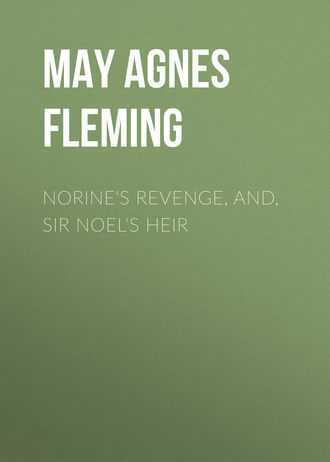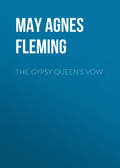
May Agnes Fleming
Norine's Revenge, and, Sir Noel's Heir
CHAPTER VIII.
FLED!
Mr. Gilbert went to his room, went to his bed, but he did not go to sleep. He lay awake so long, tossing restlessly, that, at last, in disgust, he got up dressed himself partly, and sat down in the darkness by his open chamber window; to have it out.
What was the matter with Norine? Headache; she had said – but to eyes sharpened by deep, true love, it looked much more like heartache. The averted eyes, the faltering voice, the pallid cheeks, the shrinking form, betokened something deeper than headache. Was she at the eleventh hour repenting her marriage? Was she still in love with Laurence Thorndyke? Was she pining for the freedom she had resigned? Was there no spark of affection for him in her girl's heart after all?
"I was mad and presumptuous to dream of it," he thought. "I am thirty-six – she is seventeen. I am not handsome, nor brilliant, nor attractive to a girl's fancy in any way – she is all. Yes, she is pining for him, and repenting of her hastily-plighted troth. Well, then, she shall have it back. If I loved her tenfold more than I do, and Heaven knows to love her any better than I do mortal man cannot, still I would resign her. No woman shall ever come to me as wife with her heart in the keeping of another man. Better a thousand times to part now than to part after marriage. I have seen quite too much, in my professional capacity of marrying in haste and repenting at leisure, to try it myself. I will speak to her to-morrow; she shall tell me the truth fearlessly and frankly while it is not yet too late, and if it be as I dread, why, then, I can do as better men have done – bear my pain and go my way. Poor, pretty little Norry! with her drooping face and pathetic, wistful eyes – she longs to tell me, I know, and is afraid. It is a very tender heart, a very romantic little heart, and who is to blame her if it turns to him, young and handsome as she is herself, instead of to the grave, dull, middle-aged lawyer. And yet, it will be very hard to say good-by."
He broke down for a moment, alone as he was. A great flood of recollection came over him – the thought of parting – now – was bitter indeed. A vision rose before him – Norine as he had seen her first, standing shyly downcast in the train, her dark, childlike eyes glancing imploringly around, the sensitive color coming and going in her innocent face. She arose before him again as he had seen her later, flushed and downcast, sweet and smiling, bending over Laurence Thorndyke, with "Love's young dream" written in every line of her happy face. Again as he had seen her that day when he spoke, pale, startled, troubled, afraid to accept, afraid to refuse, and faltering out the words that made him so idiotically happy, with her little, white, handsome face, keeping its startled pallor.
"Yes," he said, "yes, yes, I see it all. She said 'yes,' because it is not in her yielding, gentle, child's heart to say no. And now she is repenting when she thinks it too late. But it is not too late; to-morrow I will speak and she will answer, and if there be one lingering doubt in her mind, we will shake hands and part. My little love! I wish for your sake Laurence Thorndyke were worthy of you, and might return; but to meet him again is the worst fate that can befall you, and in three months poor Helen Holmes will be his bride."
Hark! was that a sound? He broke off his reverie to listen. No, all was still again – only the surging of the wind in the maples.
"It certainly sounded like the opening of a door below," he thought; "a rat perhaps – all are in bed."
He was looking blankly out into the windy darkness. This time to-morrow night his fate would be decided. Would he still be in this room, waiting for Thursday morning to dawn and give him Norine, or —
He broke off abruptly again. Was that a figure moving down in the gloom to the gate? Surely not, and yet something moved. A second more, and it had vanished. Was this fancy, too? He waited, he listened. Clearly through the dusk, borne on the wind, there came to him the faint, far-off sound of a laugh.
"Who can it be?" he thought, puzzled. "No fancy this time. I certainly heard a laugh. Rather an odd hour and lonely spot for mirth."
He listened once more, and once more, fainter and farther off, came on the wind that laugh. Did he dream, or did a cry mingle with it? The next instant he started to his feet as the loud, rapid rush of carriage wheels sounded through the deep silence of the night. What did it mean? Had some one stealthily left the house and driven away? He rose, drew on his coat, and without his boots, quitted his room, and descended the stairs.
The house door stood ajar – some one had left them and driven away.
He walked to the gate. Nothing was to be seen, nothing to be heard. The gloomy night sky, the tossing trees, the soughing wind, nothing else far or near.
"It may have been Reuben or Joe Kent," he thought, "and yet at this time of night and in secret! And there was a cry for help, or what certainly sounded like one. No need to puzzle over it, however – to-morrow will tell. A New England farm-house is about the last place on earth to look for mysteries."
Mr. Gilbert went to bed again, and, somewhere in the small hours, to sleep. It was rather late when he awoke, and an hour past the usual breakfast time when, his toilet completed, he descended the stairs. The storm had come in pouring rain, in driving wind, in sodden earth, and frowning sky.
Aunt Hetty was alone, the table was laid for two, a delightful odor of coffee and waffles perfumed the air. She looked up from her sewing with a smile as he bade her good-morning.
"I was just wondering if you and Norry meant to keep your rooms all day. Oh, you needn't make any apology; it is as easy to wait breakfast for two as for one. The boys and me" – (they were the "boys" still to Miss Hester Kent) – "had ours at seven o'clock. Now sit right down Mr. Gilbert, and I'll go and rout out Norry, and you and her can have your breakfast sociably together. You'll have a good many sociable breakfasts alone together, I dare say, before long. Gloomy sort of day now, ain't it?"
"Norine is not down then?" the lawyer said, startled a little, yet hardly knowing why.
"Not yet. She ain't often lazy o' mornings, ain't Norry, neither. You wait, though. I'll have her down in ten minutes."
He looked at her as though to say something, changed his mind suddenly, and took seat. Miss Kent left the room. Five minutes passed. Then she came rushing down the stairs, and back to his side, all white and frightened.
"Mr. Gilbert, Norine's not in her room! Her bed was not slept in at all last night!" She sat down all at once, pressing her hand hard over her heart. "I'm," she said, panting, "I'm very foolish, I know, but it has given me a turn."
He rose to his feet. He knew it then! As well as he ever knew it in the after time, Richard Gilbert knew it all at that moment, Norine had fled.
"It was she, then, who left the house last night," he said, in a hushed voice; "and it was a man's laugh! Was it – My God! Was it – "
He stopped, turning white with the horror of that thought.
"Call your brothers," he said, his voice ringing, his face setting white and stern as stone. "We must search for her at once. At all costs we must find her – must bring her back. Quick, Miss Kent! Your brothers! I am afraid Norine has fled."
"Fled!"
"Fled – run away from home, for fear of marrying me. Don't you understand, Miss Kent? Call your brothers, I say every minute may be worth a life – or more! Quick!"
She obeyed – stunned, stupefied by the shock, the horror of her amaze. The two men rushed wildly in, frightened by their sister's incoherent words. Rapidly, clearly, Richard Gilbert told them what he had heard last night, told them even what he feared most.
"Thorndyke has come back, and either persuaded her to run away with him or forcibly abducted her. I feel sure of it. I heard him laugh, and her cry last night as plainly as I hear my own voice now. There is not a moment to be lost. On with your coats! out with the horses, and let us be off. Better she were dead than with him."
They are gone, and the woman sits alone, stunned, speechless, unable to realize it, only dumbly conscious that something awful has happened. Norine has gone! Fled on the very eve of her bridal with another man. Norine – little Norrie, who but yesterday seemed to her as a young innocent child.
The woman sits and weeps alone by her desolate hearth. The men go forth into the world, and forget their grief for the time in the excitement of the search – the men, who have the best of it always.
All his life long that miserable day remained in Richard Gilbert's memory more as a sickening dream than as a reality. He suffered afterward – horribly – to-day he was too dazed to suffer or feel. Whether found or not, Norine Bourdon was lost to him forever; dumbly he felt that, but she must be found. At all costs, she must be brought back from Laurence Thorndyke.
The two men acted passively under his orders – awed into silence by the look on his set, white face. Even to them that day remained as a dizzy dream. Now they were at the station, listening to Gilbert's rapid, lucid inquiries and description, and the clerk shook his head.
"No," he said; "so far as he could recollect, no two parties answering the description, had left by the earliest train that morning."
Then Mr. Gilbert went backward, and tried the registers of the various hotels for the name of Thorndyke. It did not appear, but in one of the lesser hotels the question was solved.
"Thar hain't ben nobody here answerin' to that air," said the Down-East innkeeper; "but thar hes ben a chap callin' himself Smith – John Smith. That may be the cove you want. Likely's not, ye know, if he's ben up to any of his larks, he would give a false name, ye know. He come Saturday night – staid Sunday and Monday, paid his bill last evenin', and made himself scarce. Shouldn't be a mite surprised, now, if he's the rooster you're after."
"Describe him," the lawyer said, briefly.
"Wal, he was a good-lookin' young fellow as ye'd wish to see. Tall and slim and genteel, city clothes, a moustache, blueish eyes, and sorter light hair – a swell young chap, sech as we ain't used to in our house."
"Thorndyke!" the lawyer muttered, between his teeth.
"He never stirred out all Sunday," pursued mine host, "until after nightfall. Then he started off afoot, and it was past eleven when he got back. All day Monday he loafed about his room the same way, and on Monday evennin', as I said, he paid his bill, got a buggy somewhere, and drove off. And I calk'late, square, he'd been a drinkin', he kinder looked and talked that way. That's all I know about Mr. John Smith."
They telegraphed along the line, but without success. Nothing satisfactory could be discovered. It was noon now – there was a train for Boston at two. Mr. Gilbert looked at his watch.
"I will not return with you," he said, decisively. "I will go on to Boston. I am positive he will take her there. Meantime, you will leave no stone unturned to track the fugitives here."
"I'll go with you to Boston," said Uncle Reuben, quietly; "if he's taken her there, my place is on the ground. Joe will do all he can here. And by the Lord! when I do see him, I'll make it the dearest night's work he ever did in his life."
So it was arranged. In the dismal loneliness of the pouring afternoon, Joe Kent drove back alone to Kent Hill and to the tortured woman waiting there. Who knew? thought quiet Joe. Perhaps Mr. Gilbert and Reuben had been too hasty, after all. Perhaps Norine was back.
But Norine was not back. The house was empty and desolate – Aunt Hetty sat crying alone. She had gone and left no trace behind, not one word, no note, no letter. Her clothes were all untouched, except those she had worn, and her waterproof cloak. Surely she had never meant to run away, or she would have gone differently from that, and left some line of farewell, some prayer for pardon behind. It must be as Mr. Gilbert had said – the villain had taken her by force.
And while the rainy afternoon deepened into night, the two sad, silent men sat side by side, flying along to Boston. At every station inquiries were made, but no one had seen anything of a young girl and a young man answering the description given. So many came and went always it was impossible to remember. So when night fell in lashing rain and raw east wind the lawyer and the farmer were in Boston, and no trace of runaway Norine had been found.
CHAPTER IX.
"MRS. LAURENCE."
It was eleven o'clock on the Wednesday morning following that eventful Monday night. In an upper room, a private parlor of a Boston hotel, seated in an easy chair, was Miss Norine Bourdon. They had arrived this morning, and in the hotel book their names were registered "Mr. and Mrs. John Laurence."
At the present moment Miss Bourdon is alone. Her dark face is very pale, her eyelids are red from much weeping; at intervals, as she sits and thinks, the lovely dark eyes fill, the childlike lips quiver, and a sob catches her breath. And yet she is not really very unhappy. Is she not with Laurence? Before another hour passes will she not be his wife? and what is the love of aunt or uncle, what the friendship of a thousand Mr. Gilberts compared to the bliss of that? Truth to tell, the first shock of consternation at her enforced flight over, Norine had found forgiveness easy. She was only seventeen, remember; she was intensely romantic; she loved him with her whole, passionate heart – a heart capable, even at seventeen, of loving, and – who was to tell? – perhaps of hating very strongly. And most girls like bold lovers. It was a very daring coup de main, this carrying her off, quite like something in a last century novel, and with his tender, persuasive voice in her ear, his protecting arm about her waist, with her own heart pleading for him, Norine was driven away a not unwilling captive.
"I have arranged everything, my pet," said Mr. Thorndyke; "rooms are engaged at the W – House, Boston, and a clerical friend of mine is to perform the ceremony very much on the quiet. You don't object to being married in a hotel parlor, and by a Congregationalist minister, do you? By-and-by we'll take a run over the border and have the thing done over again in the sacred precincts of Notre Dame de Montreal, if you like. Just at present everything must be sub rosa, my darling. The old boy – I mean my respected uncle Darcy – will cut up deuced rough, you know, when he first comes to hear it. He expects me to marry his pet, Nellie Holmes; so does Miss Nellie, if the truth must be told. So I would have done, too, if fate and a broken limb had not thrown me upon your protection. And from that hour, my darling, my fate was sealed. Of all the eyes, blue, black, brown, green, or gray, for killing, wholesale slaughter, commend me to those of a fair Canadian. So you see, Norry, we will be married Wednesday morning nicely on the quiet, and we'll go to a place I've engaged, over Chelsea way, down by the 'sad sea waves,' to spend the honeymoon. And there for one blessed month we'll forget all the uncles and aunts, all the lawyers and heiresses in Christendom, and 'do' love among the roses. You forgive me for carrying you off in this right knightly fashion – you do, don't you, Norry? Ah! I know you do; but look up, my own love, and tell me so, and so make my happiness complete."
With a little fluttering sigh Norine obeyed, clinging close to her hero's side in the darkness.
"But you'll let me write home when we are married, and tell them, Laurence, won't you? They have been so good to me, always – always, and they will think, oh yes, they will think such dreadful things of me now."
"They will forget and forgive, never fear, Norry. People always come round when they can't do anything else. Of course you shall write to them – of course you shall do for the future precisely as you wish, and I will only exist to fulfil your commands. But not just yet, you know; not until uncle Darcy relents and forgives. Because, my pet, I haven't a dollar in the world of my own, except my allowance from him, and I can't afford to offend him. But I'll soon bring him round. Let him see you once, and all will be forgiven. The man doesn't exist, old or young, who could resist you."
All this was very delightful, of course; and in such rose-colored, romance-flavored talk, the time sped on. Norine's spirits rose with the brisk drive in the teeth of the night gale. She was with Laurence; she was never to part from him more. All life held of rapture was said for her in that. It was rather a drawback, certainly, that she might not tell them at home of her felicity at once, but she would just drop them a line from Boston to say she was safe and well and happy, that they were not to worry about her, and to beg Mr. Gilbert's – poor Mr. Gilbert's – pardon. That much Laurence would consent to, of course. To be married in a hotel parlor, by a Congregationalist Minister was also ever so little of a drawback, to a little French Canadienne, but one must not expect unalloyed earthly happiness. And had not Laurence said they would go one day to Montreal – dear old Montreal, and be remarried in Notre Dame? Then she would visit Aunt Hetty and Uncle Reuben; then she would go to New York and plead with Mr. Darcy for her beloved husband, and Mr. Darcy would grant that pardon, and then – what then? Well, nothing then, of course, only live and be happy forever after! The sloop, in which Mr. Thorndyke had engaged passage, was ready to sail. Norine was consigned to the care of the captain's wife for the trip, and was soon so utterly prostrate with mal de mer, that love and Laurence were forgotten.
To tell the truth, Mr. Thorndyke was miserably sea-sick himself; but this mode of travel had been forced upon him by the exigencies of the case. The pursuers must be thrown off the track. Gilbert would surely suspect and follow; if they went by rail, he would inevitably hunt them down. So, of necessity, he chose the sloop, and with a head wind and driving rain, spent Monday night, Tuesday, and Tuesday night sea-sick and prostrate. Wednesday morning came and they were in Boston. It came in pouring rain and leaden sky, and the bleak easterly wind your Bostonian dreads. They drove to the hotel, Miss Bourdon dreadfully ashamed of her old waterproof, and ascended to their private parlor. Mr. Thorndyke ordered breakfast to be served here at once, and both partook of that repast when it came, with very excellent appetites. Mr. Thorndyke had had some more brandy, which tonic, doubtless, stimulated his appetite, his resolution and his love together. Then he put on his hat, looked at his watch, and departed on matrimonial business intent.
"I'll be off for the Reverend Jonas Maggs (his name's the Reverend Jonas Maggs) at once, and make you Mrs. Thorndyke before you eat your dinner. And I'll order a few things here – a hat, for instance, a sacque, and a few dresses and gloves. I'll be back in an hour or two at the longest. You won't be lonely, my darling, while I'm gone?"
She had answered him "no," and with a very affectionate embrace, he had left her. But in his absence she did grow lonely, did grow saddened and remorseful. What must they think of her at home? They had discovered her flight by this time – all was consternation and terror. They would wonder what had happened – why she had gone, whither, and if alone. Aunt Hetty she could see weeping and refusing to be comforted; her uncles shocked, speechless, terrified; Mr. Gilbert pale, stern, and perhaps guessing the truth. He had loved her, very truly and dearly, and Thursday next was to have been his wedding day. Oh! what a cruel, wicked, heartless, ungrateful wretch she must be now in his sight! How he would scorn and despise her – how they all would! Would they ever forgive her for this shameful flight – this cold-blooded treachery? One day she might, perhaps, come face to face with Mr. Gilbert, in the busy whirl of New York life, and how would she ever dare to meet his angry, scornful eye? As Laurence's wife, the deepest bliss life could give would be hers, but through all her life long, even in the midst of this bliss, the trail of the serpent would be over all still, in her undying shame and remorse. The ready tears of seventeen fell, until all at once Miss Bourdon recollected that Laurence would be here presently with the clergyman, and that it would never do to be married with red eyes and a swollen nose. She sprang up, bathed her face, brushed out her long silky black hair, and by the time she had made herself pretty and bright, Mr. Thorndyke's light step came flying up the stairs, three at a bound, and Mr. Thorndyke's impetuous tap was at the door.
"Come in," she said, her heart beginning to flutter, and the bridegroom came in, handsome, smiling, eager, followed by a seedy-looking personage in rusty black, and the professional "choker" of dingy white.
"Out of patience, Norine? But I could not come an instant sooner, and it is only half-past eleven. My friend, the Reverend Jonas Maggs, Miss Bourdon, soon to be transformed into Mrs. Laurence Thorndyke; and the sooner the better. Here's the ring, Norry, bought haphazard – let's see if it fits the dear little finger. So! as if you were born in it. Now then, Mr. Maggs, pity the impatience of ardent love, and get on with the ceremony."
High spirits these for a runaway match. The handsome face was flushed, the blue eyes feverishly bright, a strong odor of cigars and cognac pervaded Mr. Thorndyke's broadcloth. The Rev. Mr. Maggs coughed, a meek, clerical cough, looked furtively and admiringly at the bride, drew forth a book, and "stood at ease." Mr. Thorndyke drew Miss Bourdon up before him, the ring between his fingers, an odd sort of smile on his lips. For Norine, she had grown ashen white; now that the supreme moment had come, she was trembling from head to foot. Even to her inexperience there was something bizarre, something wrong and abnormal, in this outre sort of marriage. A bride without bridal dress, veil or blossoms; without bridesmaid, or friend; a bridegroom splashed with mud and rain drops, without groomsman or witness. And the Rev. Mr. Maggs, for a holy man, was as dirty and disreputable a specimen of the class as one might wish to see. She stood by his side, pale to the lips, afraid of – she knew not what. As in a dream she heard Mr. Maggs gabbling over some sort of ceremony. As in a dream she saw the ring slipped over her finger. As in a dream she saw him shut up his book with a slap, and heard him pronounce them man and wife. Then for the first time she lifted her eyes, full, clear, questioning to the face of Laurence Thorndyke. For the first time, perhaps, in his own experience of himself he shrank before their crystal clear, childishly innocent gaze. His were still full of that intolerable light of triumph – that exultant smile yet lingered on his lips.
He drew Maggs aside and slipped a crisp greenback, into his hand. Then the reverend gentleman resumed his hat, bowed to the bride, wished her joy with an unctuous smile, and slowly took himself out of the room.
"My dear little wife!" Laurence Thorndyke said. "You have made me the happiest man in America to-day. For the next four weeks, in our pretty Chelsea cottage, it shall be our business to forget that the world holds another human creature than our two selves."
"And I've paid you off, I think, my friend Gilbert, with compound interest." Mr. Thorndyke added, mentally, as a rider to that pretty little speech. "I'm not over and above rich this morning, but I'd give a cool hundred to see your face."
And so, while not half a mile off, Richard Gilbert and Reuben Kent were searching, with the aid of a detective officer, every hotel in Boston, a hack was rattling over the stones to Chelsea Ferry, bearing to their bridal home Laurence Thorndyke and Norine.







